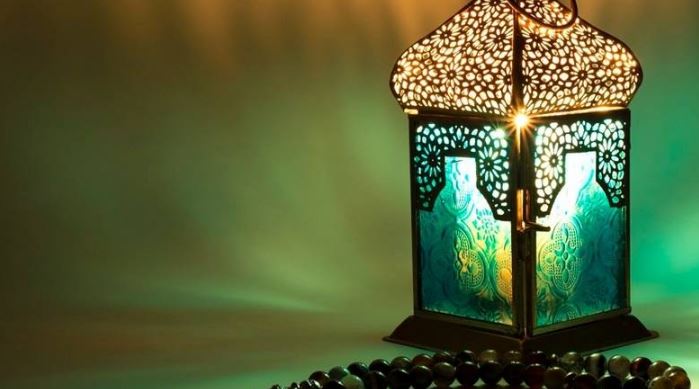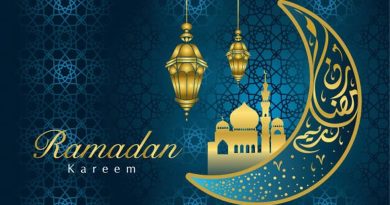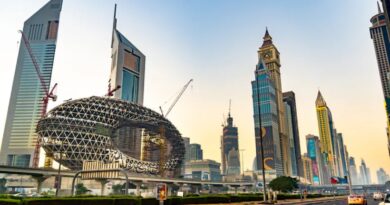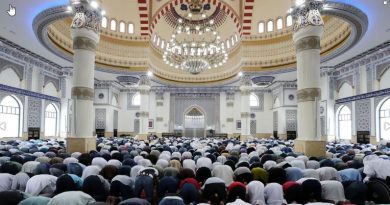Ramadan in Dubai, UAE: All you need to know about the holy month
Ramadan 2020
What is Ramadan?
Ramadan is the ninth month of the Islamic lunar calendar when Muslims fast from sunrise to sunset for approximately 30 days. The lunar calendar is based on the monthly cycles of the moon’s phases. In the month of Ramadan, Muslims believe the Holy Quran was revealed to Prophet Muhammad (PBUH) by the archangel Gabriel in the seventh century. The last 10 days of Ramadan are considered to be the holiest. The most important night is Laylat Al Qadr or the “Night of Power”, believed to be the holiest night of the year.
Ramadan is a time when practicing Muslims refrain from all food, drink, smoking, and sex from sunrise to sunset. Most Muslims spend their time in prayer, performing charitable acts, and purifying the mind and body. During Ramadan many Muslim countries often shorten workdays to allow for additional prayer time. In the UAE working hours are reduced by two hours per day. Working hours for those in the public sector are generally from 9 am until 2 pm. Timings for Ramadan 2020 are yet to be announced.
Why do Muslims fast during Ramadan?
Ramadan is compulsory for all Muslims and makes up one of the Five Pillars of Islam
The Five Pillars of Islam are Shahada: The declaration of belief in one true God; Salah: Five-time daily prayer, facing Makkah, including ablution before prayer; Zakat: Charity or giving to the poor; Haj: Pilgrimage to Makkah at least once in their life; and Sawm: Fasting during Ramadan.
Ramadan 2020 : When is Ramadan 2020 and how are the dates calculated?
According to a recent article by Khaleej Times, Ibrahim Al Jarwa, member of the Arab Union for Astronomy and Space Sciences, had mentioned that the holy month of Ramadan for the Hijri year 1441 is likely to begin on Friday, April 24, 2020. (Mohammad’s flight (the Hegira) from Mecca in A.D. 622 is the beginning of the rise of Islam. It also marks the beginning of the Islamic, or Hijri, calendar.) Al Jarwan said that astronomical calculation showed that the crescent of Ramadan will appear on Thursday, April 23, at 6:26 during the sunset, and will disappear 20 minutes after the sunset.
Also read : history of Ramadan
Ramadan 2020 : What are the hours for Ramadan?
For a detailed Ramadan timetable please visit this link.
Ramadan in Dubai : What are Iftar and Suhoor?
The meal before the beginning of the fast or dawn is called Suhoor, and the meal after sunset is called Iftar. At sunset, families end their fast with Iftar by eating dates. Eating dates is Sunnah. Thereafter, they then adjourn for Maghrib prayer, after which the main meal is served. Iftar is usually a large meal that is enjoyed with family and friends. Traditional dishes are favoured including traditional desserts. Many hotels host buffets and traditional gatherings until the early hours of the morning.
Ramadan in Dubai : Can Ramadan happen twice in a year?
Ramadan is a month in the Islamic calendar. Therefore, it takes place once a year. Ramadan is based on the lunar calendar rather than the Gregorian calendar. It takes about 33 Islamic years for Ramadan to return to the same place on the Gregorian calendar.
Read also : Ramadan 2020
Are the dates the same every year?
No, the dates are not the same every year and can vary as dates are dependent on the sighting of the moon. Ramadan moves forward by 10-11 days each year on the Gregorian calendar. However, it begins on the same day of the Islamic calendar.
What is the end of Ramadan called?
After Ramadan is over, Muslims have a three-day celebration called Eid Al Fit, where people come together to eat with family and friends, and exchange gifts.
Can Ramadan be in winter?
Yes, Ramadan can be in winter depending on the country and the month of the Gregorian calendar.
What does Ramadan mean?
The word Ramadan comes from the Arabic word ramida or ar-ramad which is translated as scorching or dryness.
What does Ramadan mean for children?
Children are not obligated to fast during Ramadan, not until they have reached the age of puberty. However, some practice to prepare for adult participation, or keep mini fasts for a few hours.
[amazon box=”B008MEITOK” “small”]
Ramadan 2020
Can non-Muslims get involved?
Many non-Muslims love the spirit of Ramadan and get involved in various ways including Suhoor events, which welcome the whole community even if you are not fasting. Many non-Muslims can get involved by having a charitable spirit during the month.
Many non-Muslims try fasting with Muslim colleagues and end their fast together at the time of Iftar. Non-Muslims can also get involved by exchanging Ramadan greetings, such as “Ramadan Kareem” which means “wish you a generous Ramadan”. “Iftar Shahy” means have a good Iftar. “Mubarak aleik al shahr” translates to “may you get the blessing of the month”, and “kil aam wa inta kheir” means “may each year pass and you be well”.
Ramadan in Dubai : What should non-Muslims expect during Ramadan?
In the UAE, Ramadan must be observed in public. This means, even non-Muslims must refrain from eating, drinking and smoking in public. In most countries that are governed by Islamic law, the same rules apply.
Which countries mark Ramadan?
There are more than 1.6 billion Muslims around the world who observe Ramadan. An example of some countries where Ramadan is observed are Saudi Arabia, Pakistan, Afghanistan, Iran, Mauritania, Oman, Yemen, Egypt, Jordan, Iraq, Kuwait, Algeria, Malaysia, Maldives, Morocco, Libya, Tunisia, United Arab Emirates, Bangladesh, Somalia, and Brunei. Many Muslims observe Ramadan in non-Muslim countries.
Observance in non-Muslim countries
Being part of an environment or community where fasting is encouraged and accommodated can increase the likelihood of people fasting successfully. People from other faiths are respectful and supportive of their Muslim colleagues or neighbours. Fasting can last longer each day for Muslims in polar regions where daylight can last for up to 22 hours.
Are there any exemptions from fasting?
Fasting is not recommended for those who suffer from medical conditions or pregnant women. Many people are exempted from observing fast. Such as those who are on a journey, the sick, the elderly, women who are pregnant or breastfeeding.
Ramadan in Dubai : Ramadan for diabetics
If you are planning to fast and you have diabetes, it is important to speak to your physician before Ramadan. Fasting can be dangerous for many people who suffer from diabetes. Your doctor will be able to advise if it is safe to fast during Ramadan and how to manage your condition throughout the fasting period.
Fasting is not an obligation for those who are ill. However, many still fast. There are some risks associated with fasting among patients who suffer from type 1 and type 2 diabetes. Some of the main diabetes-related complications of fasting include alarmingly low blood glucose (hypoglycaemia), excessively high blood glucose (hyperglycaemia), diabetic ketoacidosis and thrombosis (blood clots).
For diabetics who choose to fast during Ramadan, it is important to drink plenty of water during non-fasting hours. It is recommended that blood sugar levels are checked frequently throughout the day. This is critical for patients who require insulin. Blood sugar levels should be checked at least four times a day.
Ramadan for people with a medical condition
People with a medical condition are not obligated to fast. In Islam, fasting is considered obligatory only for those who are medically fit and have reached an age of maturity, which is usually about 14 years old. There are many ways to reap spiritual rewards for those who are unable to fast. If the condition is long term and they can’t make up the fast, then they can perform fidya, which is a small donation that you pay per day, which is given to feed a needy family.
Does using an inhaler break your fast?
Most religious leaders agree that using an inhaler does not break your fast. It is important to carry your inhaler with you as your inhaler could save your life if you have an asthma attack.
Ramadan for new converts
Ramadan for new converts may seem challenging. However, there are many support groups worldwide.
What is not allowed during Ramadan
A person who fasts must refrain from dawn until dusk from eating, drinking, smoking, sexual relations, foul language, bad conduct.
Are people permitted to listen to music during the month of Ramadan?
Many people refrain from listening to music during the holy month.
Ramadan for tourists in Dubai
Tourists are encouraged to visit Dubai during the month of Ramadan. The ambience is unmatched, from the sumptuous iftar buffets to the extended mall hours, Ramadan in Dubai offers a unique cultural experience. Tourists will be expected to respect the holy month of Ramadan even if they are not fasting.
Is there a dress code during the holy month of Ramadan?
It is recommended that both men and women dress conservatively during the month of Ramadan. Not doing so may offend those who are fasting. Individuals must refrain from wearing revealing or tight clothing. Ensuring shoulders and knees are covered during Ramadan is the best practice.
Can you shower during Ramadan?
Yes, personal hygiene should continue.
What is the etiquette regarding eating and drinking if you are not fasting?
Not to eat or drink in public places and to use designated screened-off areas in public that are well hidden from public view.
Ramadan 2020
Can you drink water during fasting in Ramadan?
Drinking water during fasting is not permissible.
Are you allowed to brush your teeth when fasting?
Even though many scholars would agree that brushing your teeth does not break your fast as long as the toothpaste and water are not swallowed, it is recommended to use a miswak, which is a teeth-cleaning twig, it is very mild and has a natural taste. The miswak comes from the Salvadora Persica tree, which has been recommended by the World Health Organisation (WHO).
Is fasting in Ramadan healthy or harmful?
Ramadan is considered to be healthy, the very same way intermittent fasting has many health benefits and is one of the most practiced diets worldwide. Ramadan has a similar concept whereby a person can only eat during certain intervals. It is reported that fasting initiates metabolic changes and lowers cholesterol levels, which reduces the chance of heart disease. Blood sugar levels are also decreased for those observing the fast.
How much weight do you lose during Ramadan?
There is no set amount of weight loss as it differs from person to person. Many dieticians see an increase in diabetes cases and weight gain due to overeating once the fast ends for the day.
What is the significance of charity during Ramadan?
Zakat is a charity that Muslims give, which is a fixed percentage of income. Muslims believe that good deeds are multiplied during Ramadan more than at any other time of the year. Therefore many donate a larger portion or all their yearly charity during this month. Zakat is one of the five pillars of Islam.
What is Haj?
Hajj is the yearly Islamic pilgrimage to Makkah, Saudi Arabia. Haj is one of the five pillars of Islam and is an obligation for all Muslims who are financially able and fit to complete it.
What is Eid and why are there two Eid festivals?
Eid Al Fitr signifies the completion of the Holy Month of Ramadan. Eid Al Adha is known as the Greater or Big Eid and follows the completion of the annual Haj pilgrimage. Traditionally, Eid is spent celebrating with family and loved ones, wearing new attire and exchanging gifts.
Eid Al Fitr is also known as the “festival of ending the fast”. The religious holiday is celebrated by Muslims globally. Eid Al Fitr has a particular Islamic prayer (salah) that consists of two units (rakats) generally performed in a mosque.
The day of Eid Al Adha falls on the tenth day in the final (twelfth) month of the Islamic Lunar Calendar, Dhul Hijjah. Eid is dependent on the sighting of the moon, following the completion of the annual holy pilgrimage of Haj.
The celebration of Eid Al Adha is to honour Prophet Abraham’s devotion to God and his readiness to sacrifice his son, Ismail. At the point of sacrifice, God replaced Ismail with a ram, which was to be slaughtered in place of his son. This command from God was a test of Prophet Abraham’s willingness and commitment to obey his Lord’s command, without question.
Eid Al Adha means the festival of sacrifice. The sacrificial animal can be a sheep, lamb, goat, cow, bull or a camel. The sheep, lamb or goat consist of one sacrifice share, whereas a bull, cow or camel consists of seven shares per animal. The animal must be in good health and over a certain age to be sacrificed.
The meat is divided into three equal portions per share. One-third is for the person making the sacrifice and their family, one-third is for the community, and the final third is to be donated to those in need. Depending on the country, the celebrations of Eid Al Adha can last anywhere between two and four days.
Ramadan in Dubai
What is Hag Al Leylah?
In the UAE, the 14th day Shaaban is known as Hag Al Leylah, a unique Khaleeji children’s holiday. The annual event, Hag Al Leylah, which means ‘For this Night’, is one of the Emirati traditional celebrations in the middle of Shaaban which is the eighth month of the Hijri calendar. Children across the UAE take to the streets of their neighbourhoods at night knocking on doors and calling out “Atoona Hag Al Laila”, which means “Give us sweets for tonight”. This tradition dates back over a hundred years to mark the arrival of Ramadan. Children don traditional clothes, and head out to collect sweets, nuts, and coins in special cloth bags, while singing traditional songs.
What does Ramadan Kareem mean?
Ramadan Kareem translates to “wishing you a generous Ramadan”.
What does Ramadan Mubarak mean?
Ramadan Mubarak translates as “happy Ramadan” or “blessed Ramadan”. Ramadan Mubarak is the most popular term used throughout the world and is the most used of the two as it was originally used by the Prophet Muhammad (PBUH).
What is wudhu?
Wudhu is ablution or an act of washing the body before performing prayers, which can be the five times daily, or the recitation of the Quran. As Muslims tend to recite the Quran more during Ramadan and pray more optional prayers to receive/attain good deeds they perform wudhu more often than usual. Wudhu needs to be refreshed if it has been nullified/broken.
The 9 steps in performing Wudhu
The first step is making an intention to complete wudhu, which is called niyyah. The following should be recited — “Bismillah Al Rahman Al Rahim”, which translates as “I commence In the name of Allah (God), the most gracious, the merciful.” Step 2: Wash both hands up to the wrists. This should be done three times ensuring that water has reached in between fingers. Step 3: Take water with your right hand, put it into your mouth and rinse thoroughly. This should be done three times. Step 4: Cleaning your nose by taking water with your right hand and splashing it into your nose and blowing it out three times. Step 5: Wash the entire face from the right ear to the left ear, and the forehead to the bottom of the chin. This should be done three times. Step 6: Washing both arms until the elbow, starting with the right arm and then the left, completing this action three times. Step 7: Move the palms of the wet hands lightly over the head, starting from the top of the forehead to the back of the head, and passing both hands over the back of the head back to the forehead. Step 8: With the same water, rub the grooves and holes of both ears with the wet index fingers, while also passing the wet thumbs behind the ears from the bottom upward. Step 9: Finally, wash both feet to the ankles three times, starting with the right foot. Make sure that water has reached between the toes and covered the rest of the foot.
Once the above steps are completed, recite the following: “Ashhadu alla ilaha illallahu, wa ash-hadu anna Muhammad an abduhu wa rasuluhu”. This means: “I bear witness that there is no deity worthy of worship except Allah alone, and I bear witness that Muhammad is His messenger.”
What nullifies or breaks wudhu?
Natural discharges such as urine, stool, gas, falling asleep, bleeding, sexual intercourse.
Water that can be used for Wudhu: Spring, sea or river water, water of melting snow or hail, water of a big tank or pond, well water.
Water that is not allowed for wudhu: Unclean or impure water, water extracted from fruit and trees, water that has changed its colour, taste, and smell, small quantity of water in which something unclean has fallen, e.g. urine, blood, stool or wine, water that has been left after drinking by animals which Muslims are not permitted to eat.
Ramadan in Dubai
Interesting facts about Islam
1. Muslims make up the world’s second-largest religious group, after Christians, with an estimated 1.8 billion Muslims worldwide.
2. Fasting, in one form or another, has always been an important part of religious life in many faiths, including: Christianity – the sacrifices of Lent; Greek Orthodox Christianity – the fasting periods of the Nativity Fast, Lent and the Assumption; Islam – the Muslim holy month of Ramadan; Judaism – fasting on Yom Kippur and certain other days of the year that mark sad events, such as Tishah B’Av.
3. Ramadan is known as the month in which the Prophet Muhammad (PBUH) received the first of the revelations that make up the Quran.
4. If a person dies during Ramadan and hasn’t completed his or her fast, whoever oversees their affairs is required to continue the fast on their behalf, once they have completed their fast.
5. During Ramadan, charities report higher levels of donations and activity.
6. Ramadan is also called the “Month of the Quran”.
7. If done correctly, fasting during Ramadan can release endorphins that improve mental well-being. It can also help detoxify the body.
8. Around the world, many Muslims often end their Ramadan fast with the homeless. This is called “feed it forward”.
9. Islam is an Arabic word that means “peace,” “security,” and “surrender.” Muslim means “one who peacefully surrenders to God”. Anyone from any race could be Muslim. In other words, “Muslim” does not refer to race.
10. Islam is the fastest-growing religion in the world today.
11. There are many inventions that have emerged from the Islamic world, including the discovery of citric acid by Jabir ibn Hayyan, arabesque architecture, the minaret, the bridge mill, the vertical-axle windmill, teaching hospitals, marching bands, early torpedoes, the guitar, the lute, the water pipe (hookah or shisha), algebra, the pinhole camera, the laws of refraction, coffee, etc.
12. The word algebra comes from the Arabic word Al Jabr.
13. Islamic astronomy became highly advanced during the Middle Ages. Astronomy was important to Muslims because it could be used to figure out the direction of Makkah so that people knew which way to face during prayers.
14. Muslims are often associated with the Arab world. However, only 15 per cent of Muslims are Arabs. Muslims are found among all ethnic groups, nationalities, and countries.
15. With a population of over 225 million Muslims, Indonesia has the largest Muslim population in the world.




